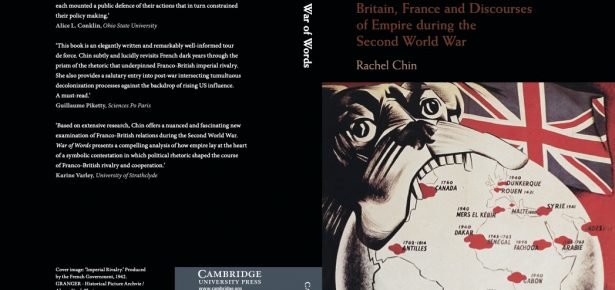
In Britain there is no shortage of academic scholarship, novels, television shows and films about the Second World War. It is a topic that plays a central role in secondary history education. It is a period that pops up at regular intervals in political discourse around hot button issues from Brexit to Covid. With such a wealth of information (and disinformation) around the Second World War, why, you may ask, do we need yet another book about this conflict?
My book, War of Words: Britain, France and Discourses of Empire during the Second World War, makes two big and necessary contributions to the ongoing and still tenacious debates around this period of history.
First, its focus on Franco-British relations through the lens of empire highlights the global character of the conflict. This perspective challenges on-going narratives that star Britain as the hero of a solitary struggle. Second, War of Words studies the rhetoric or discourse around France and Britain’s wartime relationship. It analyses the language of key policy makers, the press and the wider public. This approach demonstrates that the words around policy choices were not just an afterthought. They had real consequence and significance. They informed how policy makers and the wider public though about and conveyed decisions around key wartime policies.
War of Words analyses how the Franco-British relationship evolved from 1940-1945. It examines a series of imperial ‘crisis points’ or clashes, which took place in the French empire and its mandated territories of Syria and Lebanon.
The kinds of words and images that were emerging in the context of these clashes has a great deal to tell us. They demonstrate that policy makers were more than willing to mobilise historic, moral and cultural images to justify and condemn controversial foreign policy decisions. They also show that policy makers kept a close eye on what they thought was an accurate measure of public opinion, through close readings of popular newspapers and, to a lesser extent, public opinion surveys.
Disputes over empire played a key role in relationships between and amongst Britain, Vichy and the Free French. Analysing the rhetoric around these clashes shows that the Franco-British relationship during this time was not a question of either rivalry or cooperation.
For British policy makers, rhetoric was a way to stress the continuity and health of Franco-British relations – as wartime allies and into the future. General Charles de Gaulle also used rhetoric to celebrate Franco-British cooperation while simultaneously asserting the independence and authority of the Free French movement. Both British and Free French officials continued and were even constrained to celebrate Franco-British cooperation publicly even when tensions simmered behind closed doors.
The Vichy government highlighted historic instances of Franco-British rivalry to explain British wartime policies towards the French empire. It cast Britain as the primary villain in these imperial incursions. This had the effect of marginalising the Free French as an illegal and illegitimate entity. The response of British and Free French officials was to characterise the Vichy government as unrepresentative of French interests and therefore as inherently un-French.
This close reading of the Franco-British relationship through the lenses of war, empire and rhetoric shows us that images of Franco-British cooperation continued to play a prominent role throughout the war years. British and Free French rhetoric was a way to showcase the continuity of the wartime alliance even as Vichy French rhetoric emphasised inherent Franco-British rivalry. These strategic words and images were an important and influential policy making tool in this environment, used to confirm and challenge rooted understandings of war, identity and transnational relationships.
Latest Comments
Have your say!